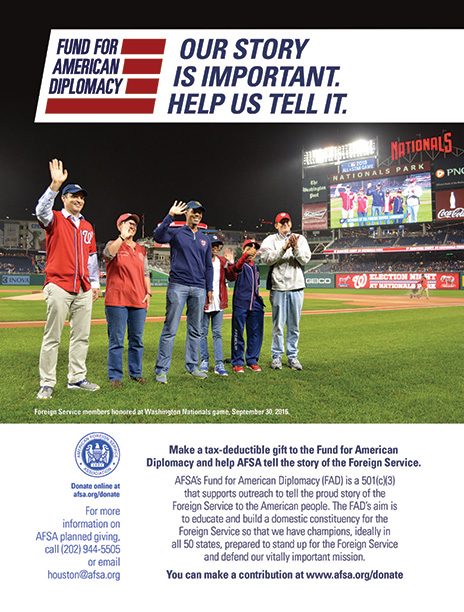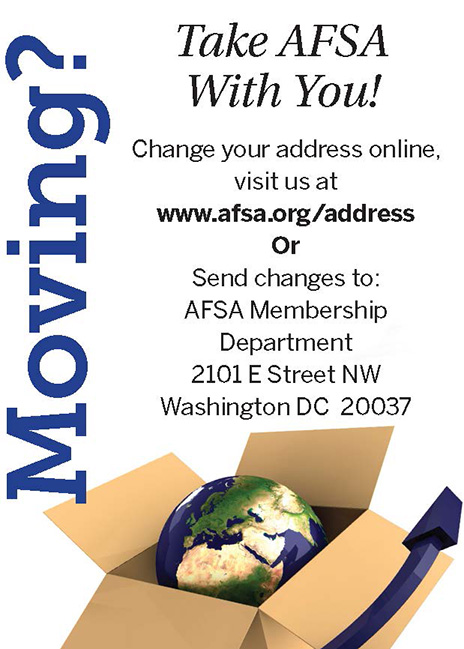Out in the Cold: How the Hiring Freeze Is Affecting Family Member Employment
Employing family members overseas isn’t just good for morale. It makes financial sense too, and helps keep our embassies functioning.
BY DONNA SCARAMASTRA GORMAN
We knew it was coming. But on Jan. 23, when the White House released a memorandum regarding an across-the-board government hiring freeze, the shockwave reverberated throughout the State Department’s community of eligible family members. EFMs typically feel like the smallest, weakest members of State, powerless to make many decisions regarding their own fates. This freeze would take away the last thing over which they could maintain some semblance of control: their job at post.
Hiring Freezes: A History
This isn’t the first hiring freeze the State Department has endured. Back when many of today’s FSOs were still in school, President Jimmy Carter authorized a federal hiring freeze. And President Ronald Reagan famously signed a memorandum ordering a hiring freeze on federal civilian employees as his first official act after his inauguration. The federal pay freeze of 2011, during the Obama administration, continued through 2014. While that freeze didn’t stop hiring, it did, combined with the 16-day government shutdown in October 2013, have a chilling effect on State Department morale and staffing.
The current hiring freeze appears to be the first to have a profoundly negative impact on the well-being of the Foreign Service EFM community. One Foreign Service officer who has worked in multiple human resources offices overseas says he is worried about spouses this time around. “The last freeze, in 2011, actually worked to our advantage for EFMs,” he explains. Because State couldn’t hire FSOs, they resorted to hiring EFMs to fill critical positions. That opened up a world of new jobs within the Expanded Professional Associates Program, as well as other professional-level positions.
But this freeze, he warns, “has the potential to damage EFM job opportunities far into the future.” Jobs that had been previously earmarked for EFMs could now be filled as Locally Employed staff positions, and the LE staff could then occupy those positions for 10 to 20 years, effectively removing those jobs from the pool of available jobs for EFMs permanently. Also, he notes, programs like EPAP, the Consular Adjudicator program and the Family Member Reserve Corps—all of which have been helping create jobs for qualified family members—will lose momentum as the freeze drags on.
The Freeze Hurts Worldwide Productivity
Of course, this freeze doesn’t just affect individual and family morale. The freeze on EFM hiring has a profound impact on posts worldwide. Family members typically take on jobs that keep posts moving forward. According to statistics compiled by the Family Liaison Office, at the end of 2016 there were 3,501 adult family members employed at missions overseas. (Another 6,688, or 56 percent of EFMs, were unemployed at post, while just 1,652 found work outside of the mission.) These working family members manage mailrooms, staff medical units, ensure that local housing meets security standards and work as security escorts, overseeing infrastructure repairs and maintenance. Without anyone to fill these roles, the work will either go undone, or it will fall to Foreign Service officers themselves to do. FSOs at some posts have already been asked to spend a specified number of hours each week helping out with some of these vital jobs, taking them away from the work they were hired and trained to do.
As the summer transfer season begins, community liaison officers (CLOs) are packing up and leaving post; when they leave, their mission-critical jobs will remain unfilled. A good CLO has multiple roles within a community: not only do they help new families transition to post, but they advise on school issues, help family members with personal or mental health issues, organize community events, work with the regional security office to ensure all family members are accounted for in emergencies, and keep the Front Office apprised of situations that could adversely affect morale at post.
According to Susan Frost, director of the Family Liaison Office, FLO is actively trying to manage the expected reduction in CLO services. “We are looking at what absolutely must be done by our CLOs at post. Safety and security; welcome and orientation; these are the most critical things for us to keep up.”
Some managers worry that without EFM oversight, there may be increased incidents of fraud and theft. In some bureaus, family members constitute 20 to 30 percent of the American workforce. Through their work, they provide oversight and control of embassy resources, ensuring, for example, that unscrupulous contractors don’t skim money from employee association accounts, or making sure that when the embassy buys something like heating oil on the local market, the oil is actually delivered as promised. Without this oversight, gas canisters, building supplies, grocery shipments and even cash can go missing, costing the State Department large sums of money.
Happy Spouses Make Happy Posts
Not everyone wants or needs to work at post. But for those who do, there is nothing more demoralizing than showing up at post and being told nobody needs you. Spouses are typically the backbone of the community: they are the ones who volunteer in the schools, manage the commissaries and welcome the newcomers. When spouses lose interest in community involvement, the entire community suffers.
Many spouses are currently trading stories of arriving at post and being offered a job, only to be turned away because their clearances didn't come through before the freeze went into effect. These spouses, who expected to begin working, are now stuck in a frustrating holding pattern, waiting to see if something shakes loose in Washington, D.C., in time for them to start. Some are considering leaving post and returning to the United States to find employment in their given fields.
In some bureaus, family members constitute 20 to 30 percent of the American workforce. Through their work, they provide oversight and control of embassy resources.
Says one spouse, a second-tour EFM who lost a promised job in Central America when the freeze began, “I think the biggest hit was to my self-esteem. I don’t like being a ‘JEFM’ (Just an EFM). I don’t have kids and since this is a very family-friendly post, everyone else who is not working is involved with kid-related activities. It’s lonely and harder to feel a part of the larger community when you don’t have a job or a purpose at post.”
She says her post’s management team is taking it harder than most of the spouses, “who are used to getting screwed over after the super-long waits for clearances, so we mostly just shrug and try to find other things to do.” But management, she says, is “super worried” about the “huge gaps in a lot of offices” after this summer’s transition.
It’s Hard Out There for a Spouse
If you’ve been a Foreign Service spouse for any length of time, you know all about resilience and creativity in the face of underemployment. You’ve been rejected for jobs that you considered beneath you, given your educational background, but wanted anyway. You’ve been told to be happy that “your housing is free” and you don’t “need” to work. You’ve likely spent days prepping for an important reception only to be ignored by most of the guests because you’re nobody important. But even the veteran spouses, the ones who’ve learned to navigate this strange world with smiles on their faces, say they haven’t seen anything this bad before.
One spouse laments the “inconsistent and often contradictory updates and messages” coming out of HR and the front office at her post. Another remarks that she knows of “at least two spouses who are seriously considering going on SMA [separate maintenance allowance] and returning to the States simply to be able to work.” In both cases, she says, “college expenses are a major factor.” Even overseas, where costs can sometimes be lower, it isn’t always easy to make ends meet on one salary.
And it’s even worse in D.C. One FSO who recently returned to the States planned to stay here for the next four years to get his son through high school. But with the freeze in place, his wife can’t find a job in her field, and the family can’t afford to live on one salary in Northern Virginia. They are looking to bid out again as quickly as possible, before they plow through all of their savings. Another spouse, the wife of a D.C.-based DS agent, says she and her husband bought a house after she was hired into a Civil Service job. But the freeze went into effect before her job started, and now the couple is trying to figure out how to make their mortgage payments when half of their expected income has suddenly vanished.
What about Unaccompanied Posts?
The situation is bad enough if you’re preparing to move to a traditional post this summer. But for FSOs getting ready to transfer to an unaccompanied post, some of whom made the decision to do an unaccompanied tour because they knew they could bring their spouses along if the spouses could find work at post, the situation looks even more dire. If you lined up an EFM job, for example, in Baghdad, you would be organizing a packout and getting ready to uproot your family. But now that your promised EFM job has disappeared, can you even go to post with your FSO spouse? One couple lined up a job for the FSO and a job for the spouse before enrolling their children in boarding school and making plans to be away for a year. But as of press time, the spouse has been told not to come to post.
“We’re straddling options at this point,” says the FSO. The couple is scheduled to depart for post this summer, and they decided to “go the boarding school route” for the kids. But then, says the FSO, “the hiring freeze kicked in”—leaving all of their plans up in the air. “At this point, for us, we just need to know so we can make decisions. It’s a whole lot more uncertainty than any of us would choose.”
One long-term spouse currently overseas says “there is absolutely no indication that this administration has any interest in mission staffing, from either a practical or a morale perspective.” She encourages spouses at her post “to be moving to Plan B right now: teleworking, freelancing, working on the local economy or, if those are not possible, obtaining certifications and degrees toward such a time as they will be able to work.”
“I’ve been a Foreign Service spouse for 24 years, and I can’t remember there ever being a freeze like this,” writes a D.C.-based spouse. “It is devastating for families and demoralizing for those blocked out of positions.” She says someone needs to “remind management that hiring spouses saves money!”
Hiring Spouses Saves Money
But HR already knows that hiring spouses makes financial sense. “We need our family members,” says Mike Tulley, director of the Office of Overseas Employment (HR/OE). He notes that hiring an EFM is a cost-effective use of resources at post. Family members, he says, have broad overseas experience and can be up and running quickly in any new job at a new post. And make no mistake: the jobs they do aren’t busywork. EFMs overseas maintain and repair both classified and unclassified computer networks. They dispense medicines and give inoculations. They write press releases, manage complex postal operations and oversee construction projects. And they do it all for far less than the cost of a traditional Foreign Service officer.
HR, says Tulley, wants to make sure that the new administration understands the value that EFMs bring to their positions: not only do they cover positions that are hard to fill, but they cost far less to hire, because “they are already at post, so we don’t need to move them, and we don’t need to provide extra allowances for them.” When a Foreign Service officer moves to post, there are associated expenses for housing, plane fare, shipping a car, paying for school and more.
The EFM is already housed, so there are no extra housing costs. Medical services and educational support for spouses and children are covered under the International Cooperative Administration Support Services, or ICASS, shared services platform whether or not the spouse is working. While no one knows the exact cost savings when it comes to hiring a qualified spouse in place of a Foreign Service officer, everyone agrees that it is far less expensive to do that.
Spouses are typically the backbone of the community: they are the ones who volunteer in the schools, manage the commissaries and welcome the newcomers.
Tulley reaffirms HR’s “commitment to spouses,” promising that the bureau is working to keep EFM jobs open so they will be available once the freeze is lifted. The bureau has told posts that they cannot convert Family Member Appointments to Personal Services Agreements: doing so would have allowed posts to hire local staff into positions that have traditionally been held by spouses, but it would have removed those jobs from the job pool for a decade or more.
Many spouses have heard the rumor that if a PSA job is announced, and a spouse applies for it, the entire hiring process for the position will be halted. According to Tulley, the rumor is true, but there is a good reason for this. “We’re freezing jobs when this happens to try to keep them vacant for spouses,” he explains. If no interested spouses come forward, local staff can be hired. But if a spouse applies, the process will shut down in the hope that the job will still be waiting for a qualified spouse once the freeze is lifted.
So should spouses apply for these jobs when they are announced at post, even though doing so will stop the hiring process? Absolutely, says FLO’s Susan Frost. “We are telling people: if you see a job you want and are qualified for, apply.” In the interim, she recommends that spouses stuck in this freeze take a long-term approach. “Ask yourself: is there training I can do? A skill I need? Can I freshen up my résumé so I’m ready when it’s time?”
“There is lots of anxiety and feelings of powerlessness in our communities right now,” says Frost. “It’s the antithesis of resiliency.” There isn’t much FLO can do to make the freeze go away, but she says FLO is working hard to “make sure these issues remain ‘at the boil.’” She adds: “We are listening.”
Meanwhile, spouses are waiting, hoping that the critical role they play at our embassies overseas will soon be recognized and reinstated by department and administration officials.
Surviving the Freeze
What can you do if you’re stuck without a job during the freeze?
Apply for the CA-AEFM program. There are no jobs available at this time, but the hiring process for the Consular Affairs–Appointment Eligible Family Member Pilot Program is a long one, and it continues during the freeze. If you’re interested in this program, apply now so you’re ready to go once the freeze is lifted.
If you’re getting ready to leave a job at post, make sure you enroll in the Family Member Reserve Corps on your way out the door. The program was started to make it easier for spouses to transfer to new posts, taking their experience and clearances with them. Even if you can’t take a job at your new post, you can and should enroll in the corps so you’re in the system when the freeze is lifted.
Get credentialed. If you’ve been thinking about getting your teaching credential, your personal training certificate, or any other job certification, now is the time to do it. FLO offers some professional development fellowships to help defray the cost. This year’s deadline to apply was May 1, but start thinking now about whether you can apply for a fellowship next year. Find information on the program at www.bit.ly/ProfDevProgram.
Talk to the Global Employment Adviser at your post to find out whether you can work on the local economy or for help finding work remotely. Email GEI@state.gov for information.
Look beyond the government for work. Reach out to colleagues on LinkedIn or other social media networks for advice and support.











